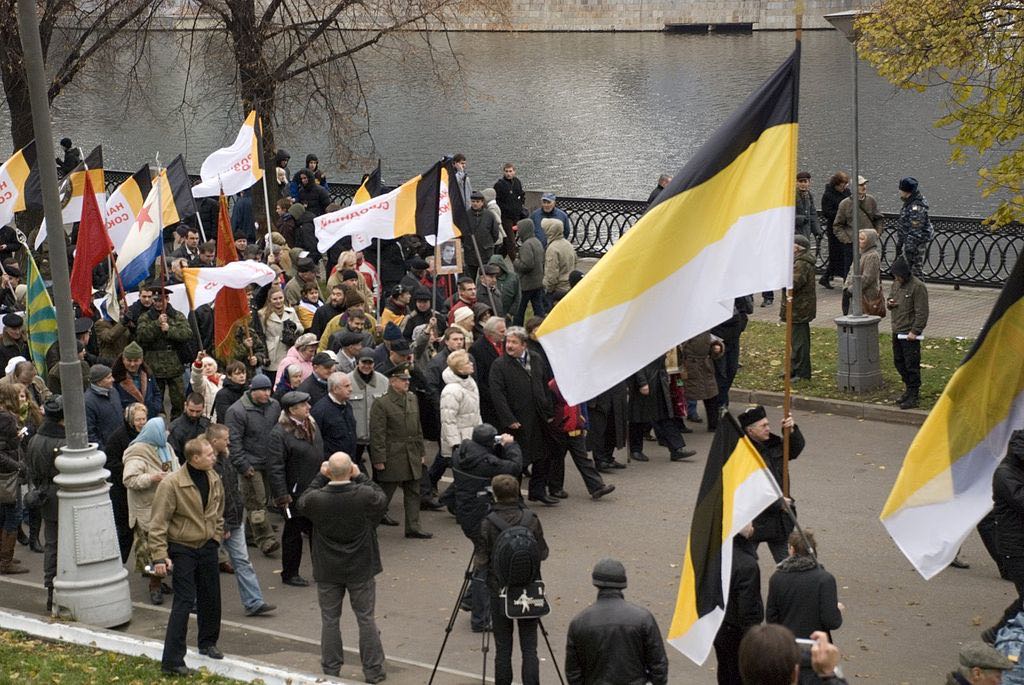In his article 'Navalny een xenofoob? Max Bader argues that Russia’s opposition leader, is not a xenophobe, but rather a moderate nationalist, who fights corruption. That statement misses one of the most important issues in today’s politics: in a country with no political culture, an oppositional politician is often a self-taught one. Which also means an unpredictable one.
Back in 2013, when Alexey Navalny ran for the seat of Moscow mayor, his nationalist past was discussed more often than ever before. On the one hand, as an oppositional activist in Putin’s Russia, he never held any position of power, and therefore never brought any of his views to life. He was, however, a frequent participant in the Russian March, an annual demonstration of Russian nationalists of all sorts, including radicals; in 2011 he even became one of the March’s organisers.
 Russian March in 2008. Black-yellow-white are Russian imperial colours. Photo free of rights
Russian March in 2008. Black-yellow-white are Russian imperial colours. Photo free of rights
Navalny was also advocating for the right to carry weapons, publishing videos in which he unambiguously compared Caucasian people to insects coming to one’s house. In this case, a gun would be better than a fly swatter, he told on camera. Already during the 2013 campaign, he promised to outlaw lezginkha, a traditional dance of Caucasian people, in Moscow.
Visa regime for muslim countries
It was also at that time that Navalny came up with an initiative to introduce a visa regime for the muslim countries of Central Asia, whose poor population often goes to work in Russia’s streets and construction sites. While this issue is beyond the mayor’s influence, Navalny devoted considerable attention to it, framing it as a fight against corruption, which he and his colleagues do brilliantly. Since most of these workers are active on the black market, he said, authorities benefit from corruption schemes, and they are not interested in stopping that. Therefore, we need visas to fight corruption.
However, anyone slightly familiar with Russian reality understands that visas, if they were introduced, would be traded the next day, and border officers will be bribed for a higher sum. Hardly an anti-corruption solution; but definitely a successful disguise of his xenophobia. After all, Ukrainians, white and Christian, who also massively went to work in Russia, were not a problem.
In 2013, discussions in Russian liberal circles focused not on Navalny’s nationalism, but on the issue of whether one should vote for him at all. The arguments pro were that it would be a vote against Putin, and that in an unfair electoral system a vote might have other effects. For instance, of withdrawing charges against Navalny, such as the Kirovles trial, one of the numerous fabricated cases against him. The arguments against were that, since the elections are fraudulous and not real, the candidates—including Navalny—are not accountable whatsoever. In other words, giving Navalny support might have turned out in an unpredictable way.
It is impossible to predict how his nationalist sentiments will play out in his policy on regional autonomy, use of language and freedom of religion
Now that he is running for president, Navalny is more than ever cautious with making nationalistic remarks. In fact, they disappeared completely. While it is not clear if he will be on ballots, his campaign is virtually the only one in the country. It already cost Navalny attacks with liquids being thrown in his face, including one that left him mostly blind in one eye. But no matter how serious the authorities take him now, it is doubtful Navalny became any more accountable.
Yes, his supporters are mainly young people tired of lies and corruption; but it says nothing about their political views: corruption is a common denominator of all dissatisfaction in Russia. True, Navalny’s colleagues are not white supremacists, but his movement is not a party with a decade-long history, and we cannot know where do they stand on many issues. While it is not their fault, they still have no voting history or track record.
Ultimately, one must imagine Russia led by Alexey Navalny. It is impossible to predict how his suppressed nationalist sentiments will play out in domestic policy on regional autonomy, use of language and freedom of religion. In 2020s, huge Russia is nothing like Eastern European states in 1989, and to start a nationalist identity building project would be a leap backwards at best, a calamity at worst. Russia, with its more than 50 official languages, urgently needs decentralisation and dismantling of its imperial system. Neither fly swatters, nor guns would do the job.
